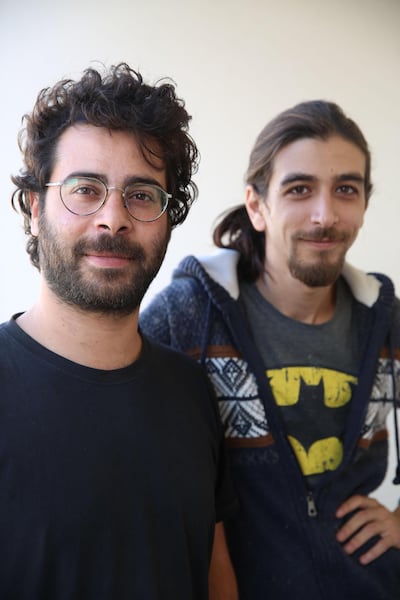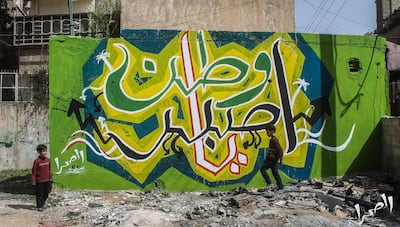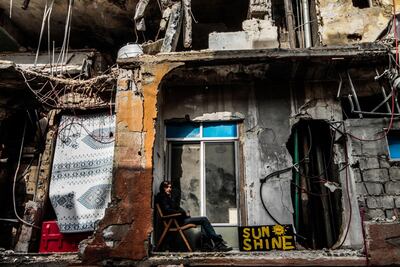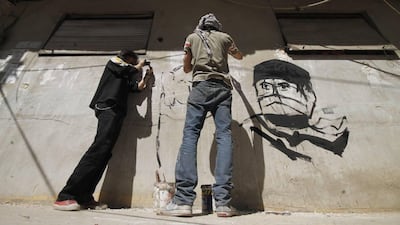Saeed Al Batal and Ghiath Ayoub's first feature-length documentary, Still Recording, is a film that exists against the odds.
Cut from 500 hours of footage, shot mainly in Douma, in Eastern Ghouta, and Damascus, from 2011 to 2015, it was smuggled to Barzeh, through rebel-built tunnels, then to Beirut, on seven hard drives. It will take the audience at the Venice Film Festival this week on a journey into the maelstrom of the Syrian Civil War, showing truths that president Bashar Al Assad tried to hide by making cameramen and journalists, "the number one enemy for the state", Al Batal, tells me from Lebanon.

“It was more important to kill us for the regime than killing anyone else at the beginning,” the filmmaker and activist says. “You get the most amount of torture. The most amount of pain. And you are targeted first, you and your family.” Consequently, he still uses a pseudonym.
When Al Batal looks at Syria now, ravaged by years of conflict, it is with horror and sadness. “This is the nightmare of the Syrian uprising,” he says. “It’s not even close to our dream.”
Still Recording attempts to show the reality on the ground. It isn't concerned with times and dates, but what happened to the Syrian people and their country "psychologically", "socially", and "on a basic human being level". As Al Batal notes, these have been extraordinary times. Conflicts often flare up in the Middle East, but Syria's has unfolded in a way not seen before.
“You never saw your own army destroying 80 per cent of the country, just to keep one person in power,” he says. “Even in books, I never read about this much destruction out of a dictatorship in Syria, or this region.”

He had been full of hope in 2011. The Arab Spring had swept through Egypt, Tunisia and Yemen, and Syrians, when they took to the streets to demonstrate against the Assad regime, thought they would also soon be free.
“A few weeks, maximum two months, and everything is going to be over – this was the optimistic outlook at the beginning of 2011 that I remember,” he says.
For the first time, Al Batal felt like he "belonged" in Syria. Until then, stripped of most of his civil rights, it had been like "living in a coma". It was as though "everyone was drugged and thought of nothing but going to work, getting food, and going back home", he says. "A simple, basic life – no activities, no cinema, no theatre – that made you feel like you are living in a place that you aren't related to."
On March 25, 2011, during the first demonstration he had ever participated in, Al Batal was arrested, and held for 18 days. The uprising had only just begun, and compared to what people would experience later, with thousands dying in detention, it "wasn't much", he says. Even then, though, he was shocked by the brutality of the police.
“It was astonishing, the amount of violence that they would use,” he recalls. “I was really surprised this could happen. This was bigger than I’d thought and more rotten than I’d thought, and I knew this really, really needed to stop.”

He had played around with cameras for years, but with the revolution, anyone able to use one became invaluable to the movement. So when other people took up arms, the camera became his “weapon”. “We depended on the camera to tell the truth about what was happening … It’s the last line of defence that we have against the lies,” he says.
At first, Al Batal's intention was to make a documentary about the battle for the liberation of Douma; however, "events never stopped happening" he says. As the regime fought back, and the city came under siege, effectively cut off from the rest of Syria and all-but forgotten by the world, the film team's cameras kept rolling via a total of five photographers. They captured a city in extremis, but also people fighting back, and the growing food shortage that was worse than almost any bullet or bomb.
"I saw most of the weapons that have been invented and used in Eastern Ghouta," he says. "But the most powerful weapon is siege. Nothing changes you like hunger – not even fear. You're like an animal. If you cannot withstand it because you are hungry, it's OK. But can you imagine if a kid, your kid, didn't eat for two days? You might kill for food. Like, literally."
The years 2013 to 2015 were especially hard, filled as they were with “catastrophes”. “Personally,” Al Batal says, “nothing kept me alive but my camera.” Even this was cold comfort, though, when sarin gas was dropped on Ghouta in 2013, killing hundreds.
“We lost hope in humanity,” he says, sadly. “Not only in Douma, in all of Syria.”
He didn’t film anything for 24 hours after the attack, and for the first time started to question the point of what he was doing. “I lost hope for at least, like, five months,” he recalls. “I felt like everything I am doing is useless, like on a personal level. And I think it was the same feeling everyone had.”
Although he had witnessed many massacres, sarin was something new, because its victims didn't look dead, but instead peacefully asleep.
“I dealt with blood many times, and it’s easier because it helps you understand the people are dead. But when there are hundreds and hundreds [including children] sleeping, and not waking up, at the same time, this is too heavy,” he says.
The memory, one of many that he had to revisit while sorting through and editing the footage in Beirut, is still raw, and he has to stop our conversation. “I don’t want to talk much more about it, if that’s OK?” he says.
Sifting through the material, going deep into feelings that his camera had shielded him from in the field, has been hard. But Al Batal feels he owes it to the dead and the broken survivors to tell their story, and leave an honest account of what happened for future generations to learn from.
“This is the main reason why I held a camera, why I write, and why I am talking to you now,” he explains. “Because you get to a feeling at some points where it isn’t worth it, and nihilism is bigger than anything else. You feel hopeless.

“But I managed to find hope. Not in the people living now, but I thought maybe children as yet unborn, they can solve this. So this is the audience that we thought about all the time while directing this movie.”
If the next generation is built on lies, he says that he fears what has happened in Syria could happen again.
“If we don’t face the truth, even if the truth is painful, I don’t see any way out: See the truth. Seek the truth. And the truth will set you free.”
___________________
Read more:
Jessica Chastain on how her new film 'Woman Walks Ahead' is changing America's favourite movie genre
Six Underground starring Ryan Reynolds to be shot in Abu Dhabi
Stree film review: comedy punches through not-so-scary horror
___________________

